Pocket Notes is where I follow Mary Oliver's instructions for living a life: Pay attention. Be astonished. Tell about it.
When I was five years old, a woman knocked on our door. We’d only gotten the keys from the landlord a couple days before. We were still unpacking boxes. I peered out the front room window at her, button down shirt, slacks, blonde hair held back with a headband. She looked older than my mom, but nearly every adult did. My mom was in her 20s. She was holding a clipboard by her side. My stomach clenched.
In our last rental, my mom had us hide behind the couch when a bill collector knocked on our apartment door. The blinds weren’t drawn on the window beside the door. She didn’t want him to know we were there. I remembered he was holding a clipboard too.
My little sister ran up to the window and looked out with me. She shouted, “Mom! Someone’s at the door!” My mom was already coming downstairs, my baby sister on her hip. I thought about saying something, but we didn’t have a couch in the front room to hide behind. And besides, the woman had probably heard my sister yell for my mom.
My mom opened the door and the woman introduced herself. She wasn’t there to talk about bills, she was there to talk about libraries. If we didn’t act now, the city might be stuck with a branch library for years, if not decades. She was collecting signatures to show that people in the community wanted to use the new city budget to fund their own city library. My mom was polite, “We are new here. I don’t know enough about this to sign anything right now. I’ve always thought branch libraries were very nice.”
This interaction stunned me. I had no idea that there were different kinds of libraries. A branch library sounded wonderful. I imagined trees with limbs trained to grow across walls – just straight and deep enough to hold a row of books. Or maybe a branch library was more like the treehouse at Disneyland, a group of rooms built around the branches of a very large tree.
I was old enough to know reality didn’t always live up to labels. It was possible that the branch library was more about the finish of the bookcases than anything else. Maybe each shelf was made with wood that still had its bark! This last one was less wonderful than the first two, but still sounded amazing. I could see why mom thought branch libraries were very nice.
Years later, I learned that branch is a word with many meanings. The woman was knocking on our door because California library systems get 94% of their funding from local governments. Each library system’s funding depends heavily on the average annual income per resident. Library systems in areas with high income averages have better facilities and services.
Our library was a branch in a county library system with a lower average income. But our city was about to be incorporated. And our city had a much higher average income per resident than the rest of the county. Once the city had its own local government, it could choose to fund its own library instead of participating in the county library system.
I didn’t know anything about funding or politics when I was in kindergarten. I just wanted to see the branch library before the woman got enough signatures to get it removed. When the boxes were unpacked, my mom took us there. It seemed I was too late. It looked a lot like all the other libraries I’d seen. The woman must have gotten enough people to sign her petition.
I’d once heard an adult say, “There’s no accounting for taste.” I thought meant you couldn’t count on people to like cool things. And I felt that keenly as I walked between the regular bookshelves in the regular building. They could’ve had a branch library! I tried to be pragmatic about the whole thing. I found the books I wanted, after all.
As a kid, I thought public libraries grew like trees. But of course, this isn’t true. Until very recently, books and all the information they contained, were the privilege of the few. Public libraries are inventions of the modern age, the product of open trade, free speech, thoughtful community and economic design. They are also marvels that could only exist in a society that values the public good. Even the tiniest little public library is a greater wonder than the branching bookshelves I imagined as a five-year-old.
A society’s commitment to public libraries reflects its commitment to freedom. And so, it is no surprise that Trump’s authoritarian administration is illegally destroying the Institute of Museum and Library Services, the federal agency responsible for funding libraries, museums and archives in every single state and territory. This illegal information enclosure is being carried out by DOGE, the illegal authoritarian enforcement agency overseen by tech reactionary, Elon Musk. If they are not stopped, your local library will close. Yes. Yours. Let me explain.
I was talking to an acquaintance the other day. She is dismayed by the destruction of the IMLS. But she seemed to be viewing the whole thing from a distance. When pressed she said the defunding wouldn’t impact her day-to-day life – her library is locally funded. But of course, she’s wrong. States and cities rely on federal agencies to disperse funds and services that cover very basic needs. All those agencies are being demolished.
Even with austerity measures, there is no city or state in America than can make up for the federal funds and services Trump is stealing from. And so, libraries – even ones that seem to be funded by local governments’ – will be defunded as money is rerouted to make up for severe shortfalls.
None of this is hopeless. We can defend our libraries and every other public good. In the next section, I share a few resources to get us all started…or keep us all going. But first I just want to share one more thought.
Have you heard about the Library of Alexandria? It was built in a royal institution of learning called the Mouseion. The Mouseion was next to an Alexandrian port on the edge of the Mediterranean Sea. People say ships weighed down with crates full of scrolls regularly arrived in the harbor. The library held all the ancient world’s knowledge. For hundreds of years, the greatest minds working in the library, probing and solving mystery.
When Julius Caesar decided the world belonged to him, he invaded Alexandria and set fire to ships in the harbor. The flames leapt to the docks and licked at the library before devouring it whole. For the next thousand years, scholars lamented the knowledge that was lost in the fire.
The first time I learned about the Library of Alexandria, I was stunned by the scale. How big did a building have to be to hold all the knowledge of the world? How hot was a fire fed by all the knowledge of the world?
The thing is…this story is not quite right. And it’s not quite right in a way that matters. The Library of Alexandria was almost certainly real. And it almost certainly existed in a royal complex next to the Alexandrian port. But it was certainly not one building that people thought of as The Library.
The ancient Greek word for library simply means “shelf that holds books.” Modern historians think that the Mouseion had a lot of different rooms that served different purposes and that most of those rooms had shelves with a lot of books. A single shelf of books in the Mouseion was a library of Alexandria, and the shelves branching across many rooms were the library of Alexandria.
We don’t really know if Caesar burned down the Mouseion, but scholars do think it burned. They also think that many of the scrolls were moved well before the burning, and many more saved in the midst of the burning. We’re missing a lot of knowledge from the ancient world, but the knowledge isn’t lost because of a single fire. It's lost because it's hard to protect documents from the effects time.
Okay. So why does this have to do with right now? Our nation’s libraries will be saved by local action. When we protect our local libraries by demanding IMLS funding is restored, we’re protecting our nation’s collected body of knowledge.
A single shelf of books is the Library of America. All the shelves in American libraries are the Library of America. Every time we save a single shelf of books, we are saving the Library of America. And saving the entire Library of America means each of us just have to go out there and save a single shelf of books.
A piece I wrote in a library
Hungry Women Life is not a folktale but I still wish some curses could be lifted.
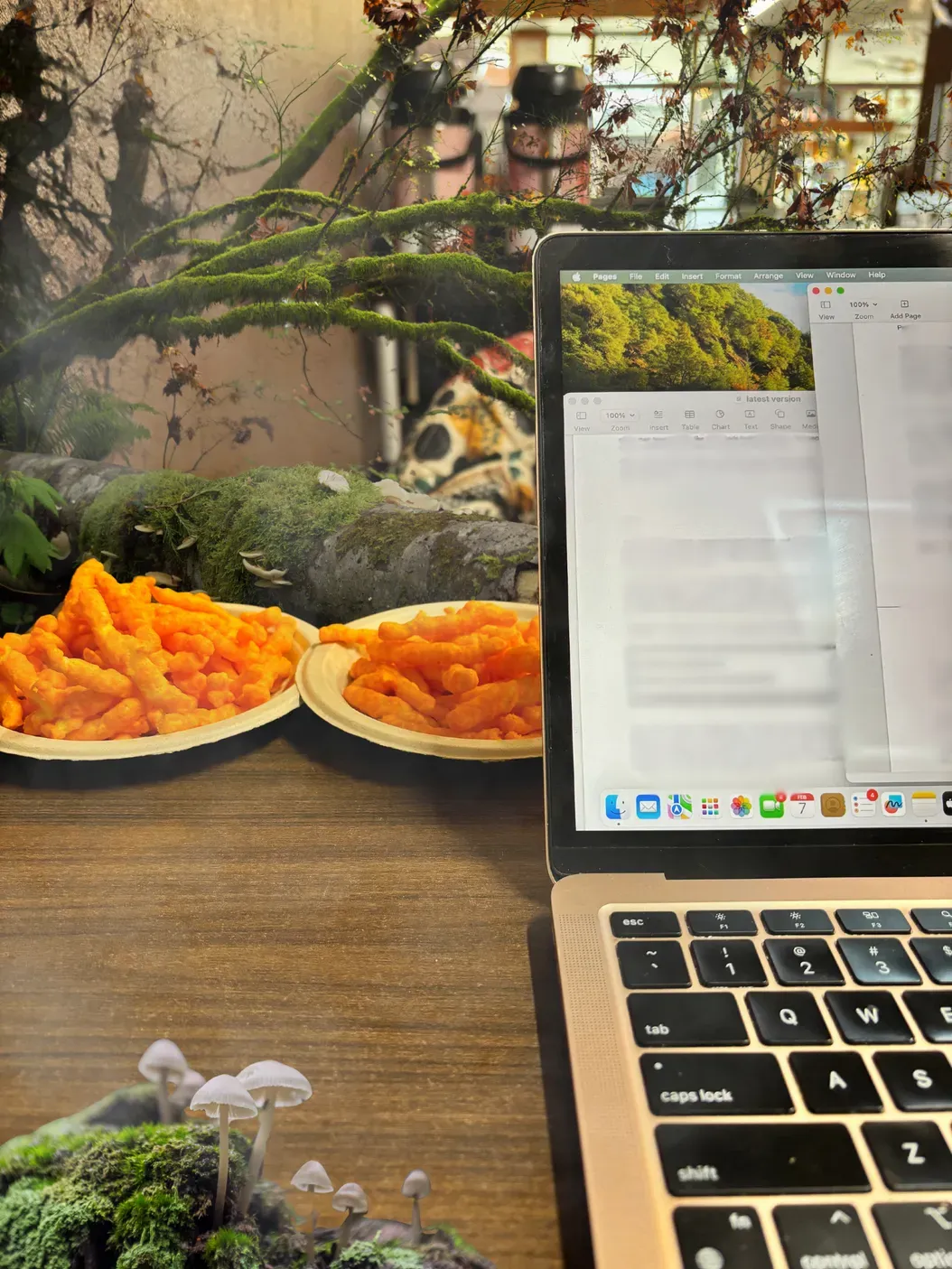
A collection of books about libraries
A new book to request from your local library
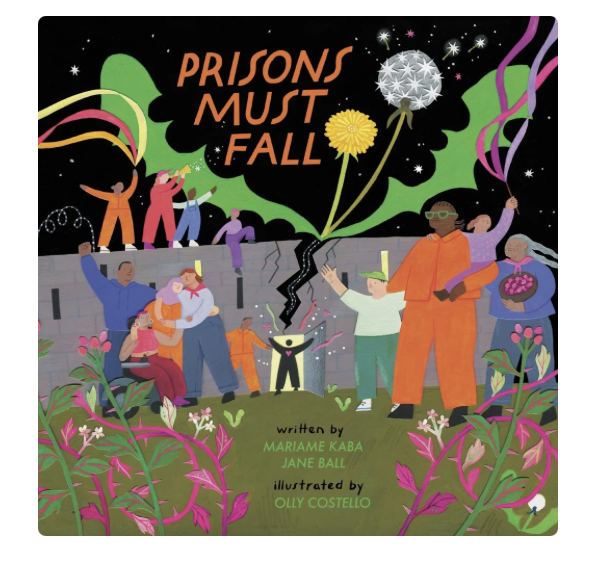
In Prisons Must Fall, Mariame Kaba, a longtime activist, together with co-author Jane Ball, present solutions that do not involve incarceration, such as meeting people’s basic needs, restorative justice, and community support—seeds for a safe world. Illustrator Olly Costello provides textured images of a global majority community and a grey, monotone backdrop that is overtaken by joyful colors. A gentle but effective addition to all social justice bookshelves and libraries. Discussion questions included.
A few words and resources from some of my favorite library defenders
Be the PUBLIC in rePUBLIC - Tressie McMillam Cottom,
who just spoke at Library Fest yesterday! One of my dear friends, Camille Andros, got to hear Cottom's speech. She called me on her way home to tell me all about it. I am so happy to got to be there.
Tressie McMillan Cottom interviews Emily Drabinski
America’s Top Librarian on the Rise of Book Bans: The American Library Association president Emily Drabinski takes stock of why libraries have become epicenters of the culture wars.
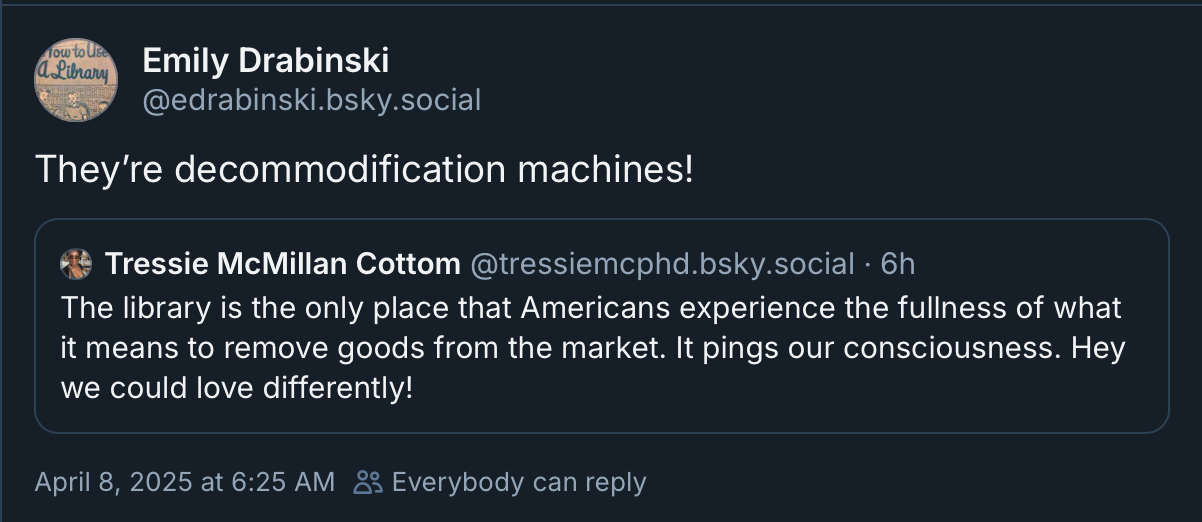
It's National Library Week!
This poster is by Raina Telgemeier, one of my family's favorite authors!
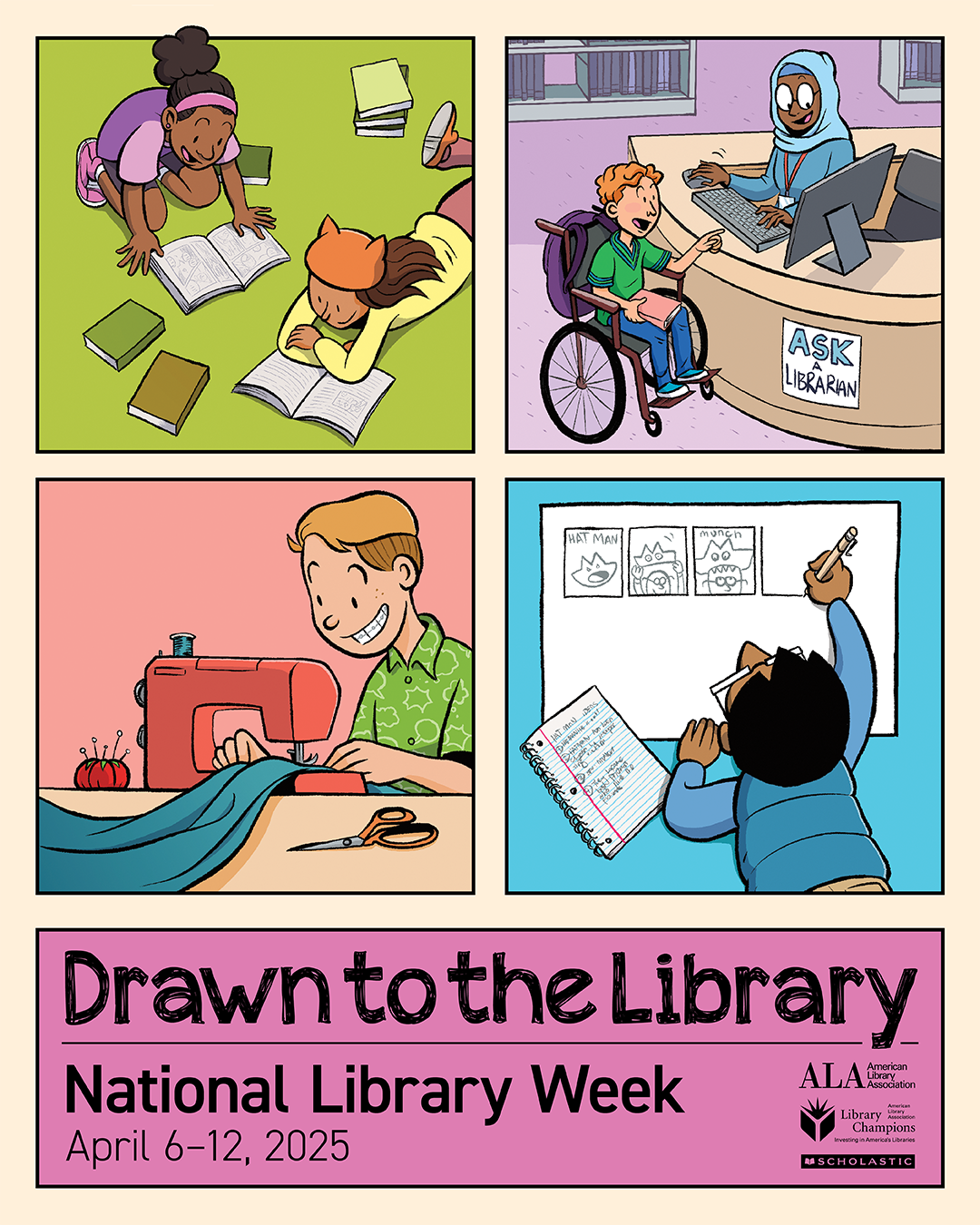
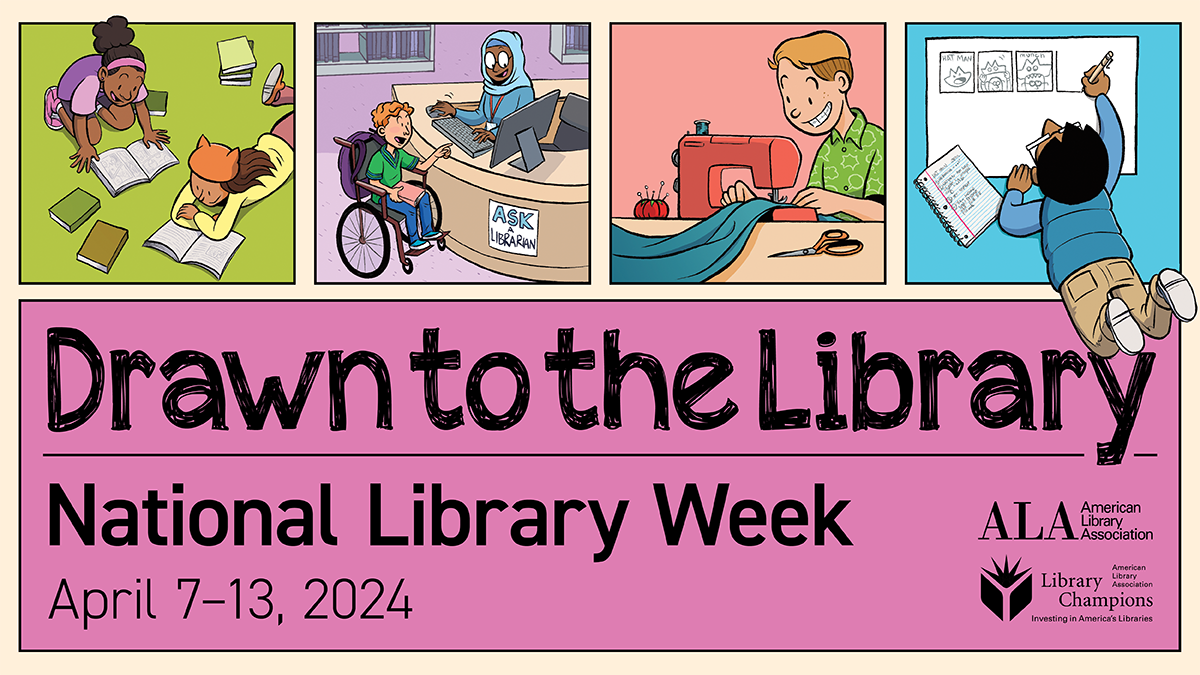
Libraries for the People will help you become a library defender. A quick excerpt from their latest newsletter:
On March 31, 2025, all staff of the Institute of Museum and Library Services (IMLS) were placed on administrative leave, just over two weeks since Donald Trump signed the March 14th Executive Order targeting the IMLS and that much further along the implementation of a long-planned attack on libraries and access to information by the right-wing. IMLS provides critical services to all libraries--public, school, and academic--and thus to people in every community in every state, as anyone can discover (at least right now) via this IMLS map-based reporting tool. IMLS funding goes towards research and a host of direct library services with local and national impact, like Interlibrary Loan (ILL), so that access to materials isn’t limited by a local library’s collection budget (for more, see statements from library system leaders here and here). Similarly critical and also at risk is eRate, a program which enables libraries across the country to provide high-speed broadband internet access, an essential service for the many people who don’t otherwise have a way to get online.
IMLS may be financially gutted or, perhaps worse, reshaped into a propaganda machine by the new director who has vowed to ensure IMLS is fully aligned with Trump’s goals. Resistance is happening though, even institutionally on the part of the IMLS board, but the true power will come, as always, from the people, so below are some easy ways for us to speak up now:
Contact elected officials using the EveryLibrary Action tools and ask your friends to do the same
Hand out this IMLS Zine at events and other actions
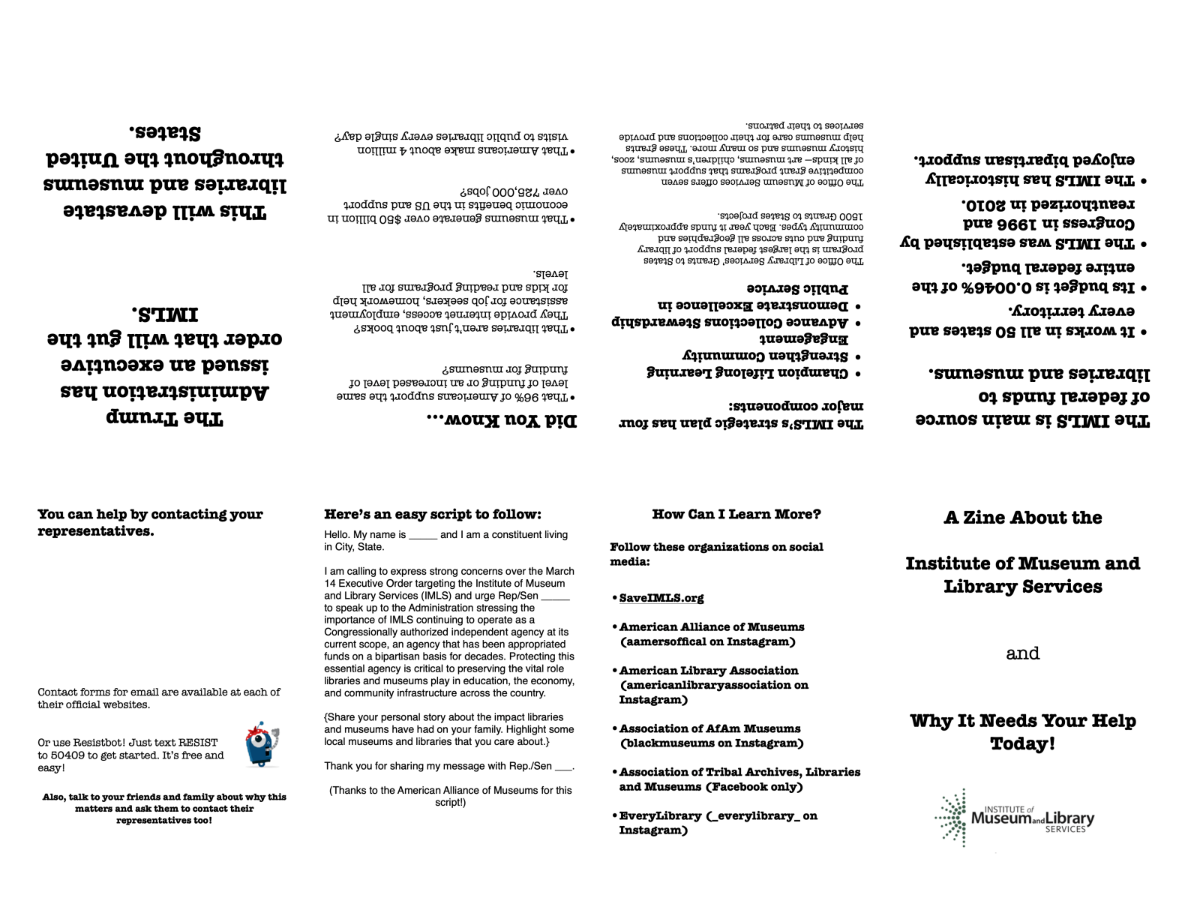
Attend your library board meeting and ask them to publicly advocate for IMLS and eRate


